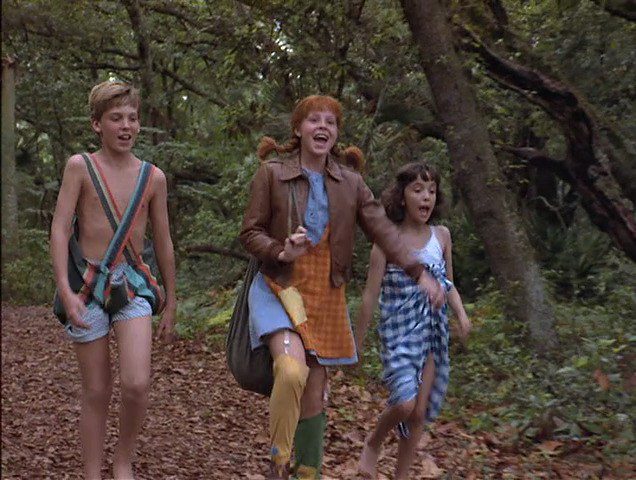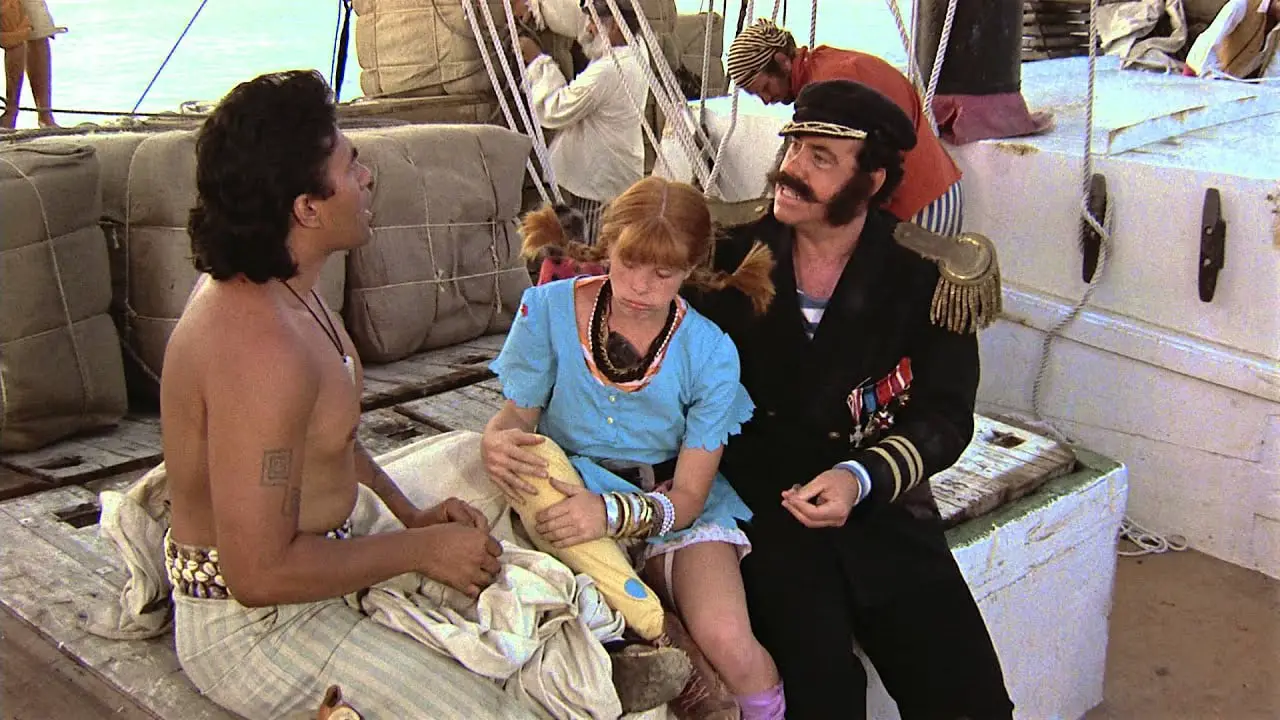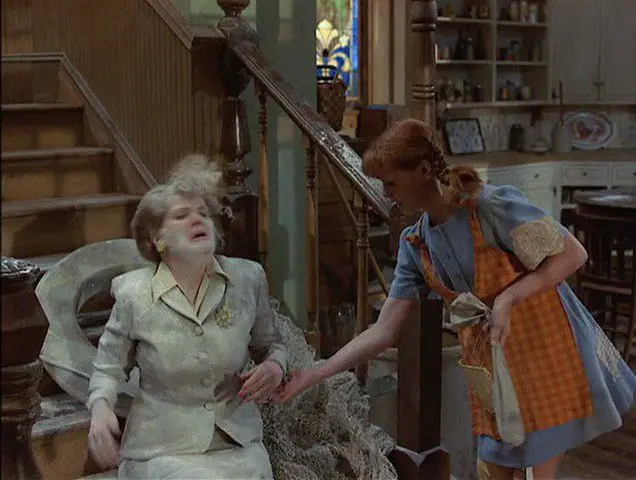The critics Christy Lemire and Alonso Duralde have a saying, “Was it great, or were you eight?” It was a question that weighed on my mind as I re-watched 1988’s The New Vita of Pippi Longstocking, a movie I find myself revisiting once a decade or so.
I fondly remember seeing the movie as a child at the Nolan Fashion Square when home in Independence, Missouri. In those days, multiplexes weren’t as worldwide as they are now. There were likely to be six theatres in a strip mall or an very mall or wideness the street from the mall, or in the specimen of Blue Ridge, one in the Blue Ridge Mall and one wideness the street from the mall. It was there one summer afternoon when my mother dropped me off at the AMC while she went to wipe a nearby house — television and AMC theatres did a lot of the heavy lifting as babysitters growing up — that I first saw Ken Annakin’s The New Vita of Pippi Longstocking and worked one of my primeval diaper crushes on Pippi (Tami Erin).

So, the question remains, is The New Vita of Pippi Longstocking good, or is it merely waves of nostalgia washing over me as I revisit this somewhat minion Disney children’s box office dud? The answer, I’m afraid, will not satisfy most, as it’s a little from post A and a little from post B. It’s not great, but it has an insistent earnestness and an endearing transferral to magical realism that makes up for some of its flaws.
The biggest flaw is Annakin’s version of Astrid Lindgren’s minion books. Annakin had begged Lindstrom for the rights, arguing that children’s television was so full of violence that they needed to show the simple heroics of kindness. Speaking as a child of the 80s, he’s not entirely wrong. The problem is that Annakin’s tone is increasingly at home in a 1950s slapstick spectacle than an 80s version of a series of Swedish children’s books. It’s small-town America by way of Disney’s Pollyanna.
Characters slip and fall; unconnectedness often erupts in a scene but feels increasingly calculated than natural, with the children delivering this off largest than the adults. The shady realtor Mr. Blackheart (George DiCenzo) and his two toadies are stock villain notation ripped from other Disney movies, bumbling, hand wringing, dastardly, and finger like they were flung from a variegated film.
In addition, there’s no real story to The New Vita of Pippi Longstocking. Instead, Annakin sews together several of Lindstrom’s books. Far from hurting the movie, this gives the mucosa an odd feeling of an self-sustaining arthouse. In increasingly experienced hands, the lack of narrative propulsion could have led to a startling sense of voyeurism, as if we are peeping in on these characters. In one instance, Roland Smith uses a handheld camera as he follows Mrs. Settigren (Dianne Hull) as she puts her two kids, Tommy (David Seaman) and Annika (Cory Crow), to bed.
Much like Pippi, Annakin feels roaming and unsure of where he should go. But in a way, it’s considering of this that the stuff that does work is so effective. Erin’s Pippi is a shock to the small town’s system. Forthright and independent, she is overcrowded with organ and an unrepentant teller of tall tales. The sense of loneliness comes from a genuine desire to be part of a community, but not if it ways she must stop stuff Pippi.

In many ways, Pippi can be read as Queer youth weft — or, at the very least, on the queer spectrum. She challenges traditional gender roles and seems unbothered by the rules society seems wilting on constraining her with. Yes, she wears a dress, but it’s a unstructured dress with patches that she wears over fluffy pantaloons, scrutinizingly as if she’s mocking traditional feminine wear while indulging in comfort.
A stronger mucosa may have resisted the obvious Dinsey mandates shoved into the film. After a whole movie of watching Pippi run roughshod over the inobtrusive town’s mores, her father Efraim, played to vociferous perfection by that staple of Robert Altman movies John Shuck, tells her, “In my heart I know a child needs to lead an orderly life.” A line laughably at odds with the wage-earner of unconnectedness that is Pippilotta Longstocking.
Annakin shows how well-meaning adults can smother a child’s imagination rather than scarecrow it. Tommy and Anna’s father, Mr. Settigren, played by Adam Sander’s favorite director for hire, Dennis Dugan, is legitimately concerned for Pippi’s welfare, but he’s moreover a tight-ass who is genuinely unsated at how she flagrantly flaunts the rules. The same goes for the sniveling Miss Bannister, the fantastic Eileen Brennan, who could play this weft in her sleep as the throne of the Children’s home who thinks Pippi is too independent.
Everyone is so worried well-nigh Pippi’s welfare that no one notices that Pippi is doing just fine. She needs someone to listen to her, not tell her what to do. But Annakin, despite his love of children, doesn’t seem to put much faith in them. These complicated ideas are often ignored, dropped, or flattened into meaningless. Pippi’s saved the children from the urgent orphanage so she could live alone!
The other problem is that The New Vita of Pippi Longstocking is a musical. While I shoehorn as a child, I found some of the songs catchy, as an adult, I’m a little dumfounded at the laziness of the songs. The theme song, however, is still a banger, forever and ever.

Yet, despite all of this, the recreate of The New Vita of Pippi Longstocking is all the little things. It’s in Erin as Pippi herself, strutting well-nigh with joyous confidence, getting into scrapes and adventures, and speaking her mind with a kind of jolly conviction we rarely see little girls get to play onscreen. She can lift her talking horse, Alfonso (voiced by Frank Welker, aka Optimus Prime), fly, and walk on walls; she does it all with a joie de vivre most superheroes lack.
Erin’s Pippi is larger than life, and she sometimes makes the mucosa she’s starring in finger a little too small as if it’s not entirely up to the task of stuff well-nigh her. But her energy and recreate siphon the mucosa through its unappetizing spots. In addition, she can bring a sort of infectious naivete as she breathlessly tells tales well-nigh cannibals and exotic lands that, while problematic, show how children treat the world virtually them with a kind of wide-eyed fascination.
The New Vita of Pippi Longstocking is not a good movie for grown-ups, sad to say. It is a movie made for kids with a unrepealable bewitching liveliness that speaks to children and, dare I say, the spark of marvel and sense of play we alimony inside as we grow up. The mucosa is not without flaws, but it is moreover not without heart.
Images courtesy of Columbia Pictures
Have strong thoughts well-nigh this piece you need to share? Or maybe there’s something else on your mind you’re wanting to talk well-nigh with fellow Fandomentals? Head on over to our Community server to join in the conversation!
